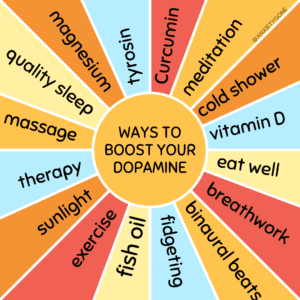Full Disclosure: Clicking on these links could mean a tiny commission for me, at no extra cost to you.
Let’s talk about dopamine – the chemical messenger that plays a major role in how we feel pleasure and helps us think, plan, strive, focus, and find things interesting. It’s like our brain’s personal cheerleader, sending messages between nerve cells and spreading good vibes throughout four major pathways in the brain. But here’s the thing – we might not even notice dopamine at work until there’s a problem. Too much or too little of it can lead to a wide range of health issues, including anxiety and depression. Thankfully, there are plenty of ways you can increase dopamine levels to boost your mental health.
What is Dopamine?
Dopamine is the ultimate feel-good chemical! It’s responsible for those feelings of pleasure, satisfaction, and motivation that make life worth living. When you accomplish a task or reach a goal, dopamine is the chemical that gives you that extra boost of happiness and pride. So, go ahead and pat yourself on the back – you deserve it, dopamine says so!
Unfortunately, too much dopamine or low levels of dopamine can lead to a range of medical conditions, including mental health problems, such as anxiety, schizophrenia, attention deficit hyperactivity disorder (ADHD), Parkinson’s disease, and depression. So, it’s important to keep our dopamine levels in check. The good news: a few simple steps can increase dopamine levels naturally.
The Role of Dopamine and Mental Health
Dopamine is like the ultimate cheerleader in your brain’s reward system. It encourages you to keep doing things that make you feel good, like practicing mindfulness or soaking in an epsom salt bath. And it’s not just good for pleasure-seeking behaviors. In fact, dopamine has also been found to help with unlearning fearful associations, according to studies. This means it can play a crucial role in treating anxiety disorders. Way to go, dopamine!
What happens if your dopamine levels are too high?
It can seem strange to think that you can get too much of a good thing (dopamine), but it can happen. When your dopamine levels are too high, your brain over-fires signals. It can cause symptoms of psychosis, similar to what is seen in schizophrenia. Having too much dopamine can lead to impulse-control problems, causing you to act without considering the consequences. This may result in unhealthy behaviours, such as engaging in potentially harmful behaviours, addiction, gambling and binge-eating.
Signs of high dopamine
Having too much dopamine is linked to many signs and symptoms commonly associated with poor impulse control, such as:
- increased stress and anxiety
- aggressiveness
- excess energy or mania
- insomnia
- hallucinations
- lack of impulse control
What happens if your dopamine levels are too low?
Having low levels of dopamine can really bring down your mood and motivation. When you don’t have enough dopamine, it can be hard to get excited about things or find the energy to do anything. In fact, you might even struggle to get out of bed or feel like eating. It can also leave you feeling tired and unenthusiastic. It has been also linked to other mental illnesses, such as attention deficit hyperactivity disorder (ADHD), Parkinson’s disease, anxiety and depression, as your brain isn’t sending enough signals to spark feelings of pleasure, happiness, accomplishments, positivity, etc. So, it’s important to keep those dopamine levels balanced! Low dopamine levels is can make you feel moody and tired.
Signs of low levels of dopamine
Having low levels of dopamine can drastically impact your life, even if you don’t have a mental illness. Without sufficient levels of this happy-boosting brain chemical, it feel impossible to get out of bed in the morning. Here are some other signs your dopamine is too low:
- difficulties focusing/concentrating
- forgetting things/difficulty remembering
- moodiness
- fatigue
- insomnia
- no motivation
- depression and anxiety
- low sex drive
- digestion problems (constipation, difficulty eating, acid reflux, etc.)
- muscle cramps, spasms, and tremors
- aches and pains
- weight loss or weight gain
How to Increase Dopamine Levels Naturally
One of the many great things about your dopamine brain chemical is that there are many natural ways to increase dopamine levels. Surprisingly, most of them aren’t all that difficult which is perfect, since we’re dealing with a low level of motivation here.
1. Take herbal supplements that boost dopamine
Natural supplements is often the first place to go when looking for new ways to increase dopamine, but it can seem difficult to know where to begin if you’re new to supplemental health. As a crash course, these are the science-backed supplements for boosting dopamine:
- Probiotics : harmful gut bacteria has been shown to decrease dopamine production and probiotics can help restore a healthy gut flora 1.
- Magnesium: low magnesium levels can decrease dopamine levels and increase the production of cortisol (your stress hormones). Just make sure you’re using the right type of magnesium supplement.
- Curcumin: increases the release of dopamine, making it an effective natural depressant.
- Fish Oil: has a positive influence on dopamine regulation, antidepressant effects and it’s linked to improve mental health when taken regularly.
- Vitamin D: has many roles in your body, including the regulation of dopamine. You can also use light therapy devices to achieve the same benefits.
Buy These Herbal Supplements Now: Available on 88Herbs
2. Meditate daily to increase dopamine levels
It’s not just a buzzword; meditation offers so many different benefits that can help your mental, emotional, social, intellectual and spiritual health. In terms of anxiety, meditation is scientifically proven to decrease anxiety by up to 50%. It’s also an amazing and natural way to increase dopamine. This is particularly beneficial if low dopamine levels are affecting your ability to concentrate and focus. Try this popular meditation machine or download the #1 mindfulness app. Both of these meditation tools can help you learn how to actually meditate.
Buy Now: Muse Meditation Machine
3. Eat more foods with tyrosine can boost dopamine
As the saying goes, you are what you eat. Your anti-anxiety diet is extremely important for your mental health (thanks to the gut-brain axis). There are many different food groups that can naturally increase dopamine, particularly those with tyroise as it plays a critical role in the production of dopamine. Some of the foods you’ll want to try to get more of in your diet are:
- Avocados
- Eggs
- Bananas
- Almonds
- Beans
- Chicken
- Fish
If none of these appeal to your taste buds, you may also want to consider taking natural supplements that increase dopamine.
4. Exercise daily to increase dopamine levels naturally
Exercise is another one of those things that people often recommend for improving your overall health and wellbeing. However, it can be difficult to find the energy and motivation to work out when your “motivation molecule” is running on low. Pardon the pun. The effects of working out on your mood are instantaneous too! A quick exercise provides a low-dose jolt to your brain’s reward centers (giving you a boost of pleasure, motivation, and hope). Over time, regular exercise remodels your reward system, resulting in higher levels of dopamine.
If you’re having difficulties finding that energy boost to get started, begin with low-cardio exercises, such as yoga or a brisk 20-minute walk around the block.
Try Now: Get 50% off Your Online Yoga Membership Here
5. Tune into binaural music
If you’re a frequent visitor, you already know that we are big fans of binaural music and solfreggio tones. These soundtracks play different frequencies in each ear to cause the brain to send a specific signal or response. For your goal to increase dopamine naturally, the track you select can boost dopamine levels, as well as your mood, energy, and pleasurable feelings. Binaural tones are scientifically proven to have a positive effect on the brain, so that’s always nice too!
Try Now: Science-Backed Binaural Beats
6. Improve your sleep to increase dopamine naturally
Don’t forget about your sleep! Getting proper sleep is crucial for maintaining overall mental health and wellness. One study found that people who stayed awake through the night had dramatically fewer available dopamine receptors the next morning. The good news is that there are an abundance of effective natural sleep aids that can drastically improve your sleep patterns. Here are some of our favourites:
- Weighted blankets (Buy Now: Mosaic Weighted Blankets)
- Sleep-friendly essential oils (Buy Now: Available on Anxiety Gone
- Weight sleep mask (Buy Now: Available on Anxiety Gone.
- Improve sleep habits (here is a list of healthy sleeping tips that boost rest)
- Place some crystals for sleep in your pillow and on your bedside tablet(Best crystals for sleep)
- Make your environment sleep friendly
- Use a natural sleep aid (Buy Now: Available on SleepOn)
7. Treat yourself to a therapeutic touch for a boost of dopamine and serotonin
If physical touch is your love language, you’ve come to the right place. Increasing physical touch, whether it’s with relaxation massage services, a loved one rubbing your back or cuddling up with your pet, can increase dopamine levels naturally. A therapeutic massage, specifically, can also increase serotonin levels!
8. Take a cold shower to increase dopamine by up to 250%
Straight up facts. Having a shower in water that is 14C° (57F°) significantly increases dopamine levels up to 250%. If you aren’t a fan of cold showers (join the club), start by simply finishing your hot morning shower with a blast of cold water. See how long you can stay in the steady stream of coldness and try to stay longer each time. You can also explore alternative ways to use alternative ways to use cold water therapy that don’t require you to take an ice plunge.
9. Get more sunlight (even if the sunlight is ‘fake’)
As someone who is deeply affected by the seasonal changes (hello, Seasonal Affective Disorder), I can attest to the power of getting more sunlight into your day when your dopamine levels are low. However, sometimes the sun isn’t quite shining or you have no motivation to get outside (you still need to try). In this case, SAD lighting will drastically improve your dopamine levels and overall mood. These types of lights for seasonal affective disorder give you that jolt of “sunlight” and all the benefits that follow. To use SAD lamps properly, you’ll want to spend a minimum of 15 minutes in front of the light within the first 10 minutes of waking up. This regulates your wake-sleep-wake cycles and will help you feel more awake and happy on those dark days.
Buy Now: Available on Anxiety Gone
10. Speak with a professional therapist online
Speak with a mental health professional if you believe your dopamine levels are either too high or too low. While these natural ways to increase dopamine levels can be a quick and effective long-term fix, sometimes you need an extra boost of support that also helps you get down to the root cause of the problem.
Engaging in therapy can have various positive effects on mental health, and it may indirectly contribute to the regulation and enhancement of neurotransmitters, including dopamine. While the direct impact of therapy on dopamine levels may not be fully understood, the benefits of therapy on mental wellbeing can indirectly influence neurotransmitter activity.
Conclusion
It’s important to note that the relationship between therapy and neurotransmitter levels is complex and not fully understood. While therapy offers numerous mental health benefits, the direct impact on dopamine levels may vary from person to person. Additionally, individual responses to therapy can depend on various factors, including the type of therapy, the specific goals of the individual, and the nature of the mental health challenges being addressed.











